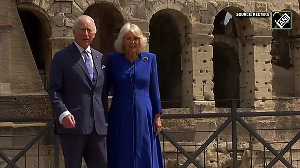 Experts tell Carnegie Endowment for International Peace that a Narendra Modi government may be Asia oriented, but the US will remain a deep influence. Aziz Haniffa reports.
Experts tell Carnegie Endowment for International Peace that a Narendra Modi government may be Asia oriented, but the US will remain a deep influence. Aziz Haniffa reports.
The Carnegie Endowment for International Peace, which has been hosting back-to-back seminars and conferences on India’s elections for the past month, although acknowledging that foreign and security policy would not move a single vote in the Indian ballot, convened a discussion on India’s post-election foreign policy.
As expected, the lack of indication from the Bharatiya Janata Party’s prime ministerial candidate Narendra Modi, who is being virtually anointed as India’s presumptive new prime minister, regarding his government’s foreign and security policy -- least of all toward the United States -- did not preclude the experts from confidently declaring that it would be a more Look East perspective.
Jayant Prasad, former Indian ambassador to Afghanistan, Algeria, Nepal, and the United Nations Conference on Disarmament in Geneva, said, “We are likely to have for the future prime minister of India, who, not for his own volition, has got minimal exposure to the US.”
He told the packed audience that in Modi, “You are going to have a prime minister of India who has had the red carpet rolled out for him in the Great Hall of Peoples in Beijing, has had repeated meetings with (Japan’s prime minister) Shinzo Abe. And even though he was not the prime minister, he was the person who called Abe after his election.”
“The first, most immediate things he is going to do, is going to be oriented toward Asia, because that’s what he’s familiar with. As chief minister of Gujarat, he’s had the Chinese, the Japanese, and the Koreans investing heavily in his state.”
But Prasad argued that Washington need not get any palpitations in this regard, “That’s not bad news for the US because potentially his coming will be a good augury for a variety of reasons.”
He gave a laundry list of reasons to justify his contention, “First, his foremost exclusive priority would be on growth and Indian growth will not be possible without technology and capital, on both of which the US will play a critical role.”
“Secondly, his focus on protecting India internally, as long as there is a problem of export of terrorism from the contiguity, to also to strengthen the borders. His focus on homeland security is a plus,” he said.
He added, “The one important relationship that you are going to see in the new government immediately is going to be with Japan. And without a benign Indo-US injection in that triangular relationship, the Japan-India relationship will continue to suffer from limitations. Japan has already for several years, become India’s greatest financier, external donor and that’s going to gather under the new government and there again, the US relationship will help.”
Prasad also spoke about how any new Indian government ought to tackle its immediate neighbours.
He said, “We cannot have cooperative relationships in South Asia merely on the basis of what people have articulated in the past -- some have called it the Gujral Doctrine. India can’t go on the global stage and have any expectations of recognition as a great power in the making without establishing relationships in the neighbourhood, which is a transformed relationship than it is today.”
It was imperative, he said, “To have the best possible relationship with Pakistan, for the sake of India, for the sake of Pakistan and for the sake of the larger prosperity of the region." Any unraveling of Pakistan, he said, “would entail far greater burdens on India than anything that might happen in Afghanistan.”
Prasad also spoke of Afghanistan and how it would not cease to be a growing concern, “Until in the long term it becomes a bridge between Iran and Central Asia and China and the Indian subcontinent, and that cannot be possible without the full cooperation of Pakistan. That won’t be possible until we have the best possible and most practical relationship between India and Pakistan.”
Asked specifically what Modi’s strategy should be regarding Pakistan, Prasad said, “Given the strategic equations, including the strategic equations in the subcontinent, India has no options but to continue to engage with Pakistani leadership. On the Indian side, there has to be reasonable patience to allow space for the Pakistani leadership, for the political dynamics to play itself out because every time we have made some progress in Pakistan at some point during the United Progressive Alliance government rule -- there was considerable progress made through back-channel talks -- but before those contents were disseminated to the political system, political equations began to change, first in Pakistan and then in India.”
With regard to China, Prasad said there was no way Modi could take the Indian economy forward without a constructive engagement with its eastern neighbour, notwithstanding Beijing’s presence ‘in a creeping and pervasive manner in our neighbourhood.’
He said, “Neither the US nor India is going to give up their relationship with China and predicating a relationship between India and the US solely on whether we want to keep China in check and how much check, would be very dangerous, especially for the weaker partner in the relationship, which is India. So, we are not going to do it.”
The difficult question, Prasad asked, was, “Are you going to take some practical lessons from the triangle that you form?”
Image: Bharatiya Janata Party's prime ministerial candidate Narendra Modi with Japan Prime Minister Shinzo Abe.











 © 2025
© 2025